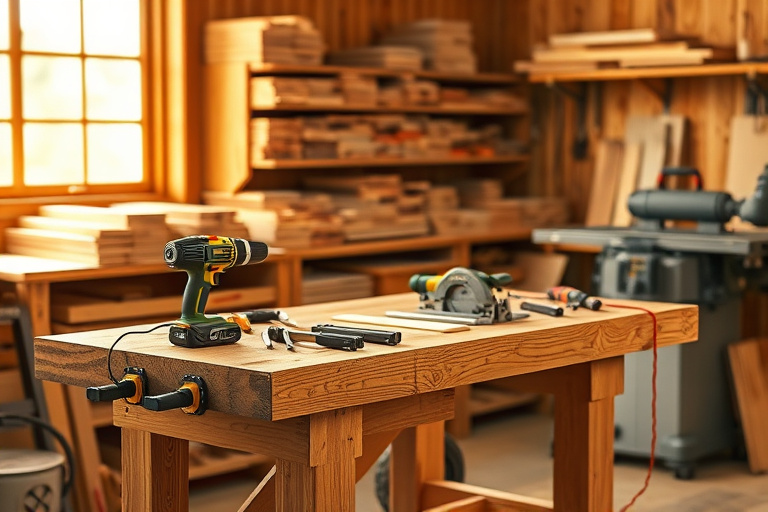In any woodworking space, the quality of your tools determines both the speed and the quality of your results. For the uninitiated, the phrase best tools for workshop might conjure expensive machinery, but the reality is more nuanced: you need a well balanced kit that covers hand skills, precision, safety, and efficiency. Whether you are building heirloom furniture, tackling repairs, or dabbling in home projects, having a reliable set of tools is the difference between a frustrating slog and a satisfying run of productive sessions.
Before you invest, it helps to understand what makes a tool the best choice for your workshop. You want gear that feels comfortable in hand, handles accurate cuts, and lasts through years of use. You also want a system that keeps your workspace organized, minimizes waste, and reduces dust and noise where possible. The idea is to assemble a toolkit that grows with you, rather than a collection of one off gadgets that only serve a single project. This guide covers the categories you should consider, practical buying tips, and resources that can accelerate your progress, including curated plans from trusted woodworking resources.
What qualifies as the best tools for workshop?
When evaluating tools for your workspace, several criteria matter: reliability, ergonomics, versatility, and ease of maintenance. The best tools for workshop aren’t always the most expensive, but they tend to offer higher durability, better accuracy, and safer operation. Look for tools with comfortable grips, well balanced weight, smooth feeds, and clear alignment marks. Good tools also come with robust accessories and a sensible dust management option, since clean air and clear sightlines dramatically improve precision over long sessions.
Another key factor is fit for purpose. A compact project might benefit from a different mix than a full scale cabinetry shop. For example, if you frequently cut plywood, a precise miter saw with solid stops will pay off quickly. If you work with intricate joinery, a high quality chiseling set and a bench plane can dramatically improve both speed and finish. And no matter what you’re building, a stable workbench, proper clamps, and a reliable measuring system form the foundation of any capable workshop.
Core tool categories
- Hand tools such as chisels, planes, pliers, chisels, scrapers, marking gauges, and a robust hammer form the tactile backbone of woodworking. They teach feel, let you make adjustments on the fly, and require minimal setup.
- Power tools including a drill/driver, circular saw, jigsaw, and a compact router. These speed workflows and expand your capabilities, but choose models with good safety features and dust collection compatibility.
- Station and safety essentials such as a sturdy workbench, bench dogs, clamps, a dust collection or extraction setup, eye and ear protection, and a reliable bleed of airflow. Safety gear is a core investment because it protects you as you push the boundaries of your craft.
Essential tools for any workshop
Regardless of your budget, there are certain tools you should prioritize to ensure you can start and complete most common woodworking projects. Think of these as the core toolkit that makes your best tools for workshop truly effective.
Hand tools
Quality hand tools teach you control and build technique. A sharp set of chisels, a reliable marking knife, and a smoothing plane are worth the investment. Don’t overlook accurate measuring tools such as a steel rule, combination square, and a good marking gauge. These help preserve precision as you lay out joints and cut lines. Ergonomics matter here; if a handle feels awkward or a blade burrs easily, you’ll slow down the project and increase error rates.
Power tools
Power tools extend your reach and speed, but they must be used responsibly. Start with a dependable drill/driver for holes and driving fasteners, then add a circular saw for straight cuts and a jigsaw for curves. A compact router and a router table can unlock powerful joinery and edge shaping. If space permits, a small benchtop planer or jointer can be a game changer for getting uniform thickness on boards before building. When selecting power tools, prioritize built in safety features such as blade guards, emergency shutoffs, and dust collection compatibility. Proper maintenance—like keeping blades sharp and aligning fences—will keep your tools for workshop performing at their best over years of use.
Station and safety essentials
A solid workbench is the heart of any workshop. It should be stable, flat, and spacious enough for your typical assemblies. Add a well organized clamp system and a good storage solution so that everything you use most is within arm’s reach. Dust collection isn’t just about cleanliness; it helps improve visibility and prolong tool life by reducing debris that can clog bearings or abrade surfaces. Don’t neglect safety gear such as eye protection, hearing protection, a dust mask or respirator, and a first aid kit. Safety should be considered a design feature of your workspace, not an afterthought.
To help you tailor your tool selection, you can explore resources that cover specialty tools and beginner friendly guidance. For specialty carpentry tools master your craft with precision and plans from Ted’s woodworking, you can learn more at this guide: specialty carpentry tools master your craft with precision and plans from Ted’s woodworking. This is a great way to understand how specialized tools can elevate your setup for specific projects.
For those just starting out, the starter carpentry tools your complete guide to beginner projects with Ted’s woodworking offers a clear path to building confidence and capability: starter carpentry tools your complete guide to beginner projects with Ted’s woodworking.
How to choose the best tools for workshop for your space and budget
Choosing the best tools for workshop is about balancing quality, space, and your project mix. Here are practical steps to guide your decision:
- Assess your typical projects: Do you build furniture, repair items, or focus on finishing and details? Your project profile should drive tool choices. If you frequently cut large sheet goods, prioritize a solid circular saw and a sturdy straight edge setup. For fine joinery, invest in chisels, a smoothing plane, and a brace or hand drill.
- Measure your space: A compact shop may benefit from multi function tools and combo machines, while a larger space can accommodate dedicated machines with room for workflow.
- Set a budget with growth in mind: Start with essentials and a few high impact upgrades. You don’t need every gadget at once; a staged approach keeps costs manageable and allows you to learn what you truly need next.
- Prioritize ergonomics and maintenance: Comfortable grips, balanced weight, clear alignment markers, and easy blade changes reduce fatigue and improve precision. Regular maintenance, such as blade sharpening and alignment checks, extends tool life and keeps performance consistent.
As you decide, consider how a curated resource like Ted s woodworking can support your learning curve and project variety. For a broader set of plans and a guided library that pairs well with the best tools for workshop, you can explore offerings via the official affiliate link: Ted s Woodworking on ClickBank.
Beyond individual tools, many woodworkers benefit from ready made plans, project step by step instructions, and lifetime access to a library of designs. Ted s Woodworking is a well known resource in the community, offering thousands of project plans and a structure that helps you scale from simple to more complex builds. When evaluating a resource like this, look for breadth of projects, clear materials lists, cut lists, and compatibility with your tools and skill level. While you don t need every plan, having access to a diverse library can significantly shorten your learning curve and keep you motivated to try new projects.
Specialty carpentry tools
For hobbyists who want to push into joinery, cabinet making, or detailed woodworking, specialty tools can dramatically improve outcomes. The related guide on specialty carpentry tools provides insights into which tools deliver the most value for the typically challenging tasks you face in a shop. If you are curious about this topic, you might find it useful to read this resource: specialty carpentry tools master your craft with precision and plans from Ted’s woodworking.
Starter carpentry tools
Beginning woodworkers often wonder what to buy first. A structured starter kit helps you gain hands on experience quickly and avoid buyer s remorse. The starter carpentry tools guide covers essential items, what they do, and how to build confidence with your first projects. For beginners, explore this resource: starter carpentry tools your complete guide to beginner projects with Ted’s woodworking.
Maintenance and safety tips
Keeping your tools in good working order is as important as choosing the right tools for workshop. Regularly inspect blades and bits for dull edges or nicks, verify alignment on fences and belts, and store tools in a dry, organized space to prevent rust and damage. Safety should be front and center in every session. Wear eye and hearing protection, use clamps to secure workpieces, and keep the workspace well lit and free of trip hazards. A clean shop not only reduces the risk of accidents but also supports more precise work, enabling you to push the limits of the best tools for workshop without compromising safety.
Conclusion and next steps
The best tools for workshop are the ones that fit your projects, space, and budget, while enabling you to work safely and consistently. Start with a core set that covers hand capabilities, essential power options, and a sturdy work surface. As you gain experience, you can expand thoughtfully with specialty tools and a robust library of plans to inspire your next builds. Remember that learning and practice matter as much as equipment; the right guidance can accelerate your progress and help you enjoy woodworking more fully.
If you are ready to explore more plans and see how a large catalog of projects can complement your toolset, consider the Ted s Woodworking resource through the affiliate link above. It can be a valuable addition to your toolkit as you refine your craft and tackle more ambitious projects.




